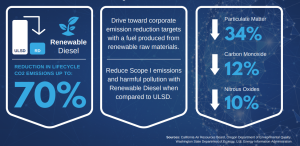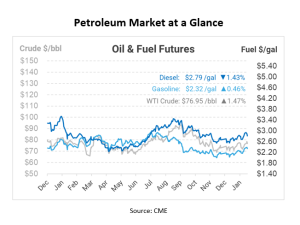
New EPA Air Quality Standards: Renewable Diesel May Lead the Way
The U.S. Environmental Protection Agency (EPA) made an important move by setting stricter rules on air quality standards to reduce fine particle pollution, also called soot, in the air. This plan aims to help families, workers, and communities all over the US. The EPA wants to make the air quality standard better every year, reducing pollution’s bad effects, saving lives, and helping the economy grow. This move aligns with the Clean Air Act’s mandate and emphasizes a commitment to improving public health.
The new standard is part of a comprehensive strategy that leverages complementary EPA regulations targeting pollution from various sources, such as power plants, vehicles, and industrial facilities. Since 2000, particulate matter (PM2.5) concentrations have decreased by 42%, while the U.S. Gross Domestic Product has increased by 52%, highlighting the potential for economic growth alongside environmental protection. The implications of this regulatory action are strong, with estimates suggesting that it could prevent up to 4,500 premature deaths and 290,000 lost workdays annually.
How does it affect the transport industry?
As the EPA strengthens regulations on particulate matter pollution, there’s increased pressure on the transport industry to transition towards cleaner fuel options. This shift not only helps meet regulatory requirements but also contributes to environmental sustainability efforts by reducing greenhouse gas emissions and improving public health.
One innovative solution gaining traction in the search for cleaner fuels is Renewable Diesel (RD). Unlike conventional diesel, RD is derived from renewable sources such as vegetable oils, animal fats, and greases, making it a sustainable alternative with significantly lower emissions. In fact, Renewable Diesel emits 34% less particulate matter than Ultra-Low Sulfur Diesel (ULSD), aligning perfectly with the EPA’s cleaner air standards.
According to Jessica Masters, Director of Sustainability at Mansfield Energy, the support of key stakeholders is crucial to achieving such ambitious sustainability goals. “By embracing Renewable Diesel, we not only reduce harmful pollutants but also contribute to a cleaner, healthier environment for future generations,” explains Masters.
 Sources: California Air Resources Board, Oregon Department of Environmental Quality, Washington State Department of Ecology, U.S. Energy Information Administration
Sources: California Air Resources Board, Oregon Department of Environmental Quality, Washington State Department of Ecology, U.S. Energy Information Administration
This fuel is easy to use and performs exceptionally well, which can lead to significant savings on operating costs. Due to its high cetane levels ensuring cleaner burning and fewer emissions, it not only makes engines work better but also allows them to go longer between servicing. Additionally, it’s more stable for storage over time, making it safer and more convenient. Importantly, top engine manufacturers approve of Renewable Diesel, meaning businesses don’t have to spend money converting their engines.
With a focus on innovation and environmental stewardship, Mansfield Energy is continuously supporting the adoption of clean energy solutions to help tackle the new air quality standards. As more businesses look for sustainable solutions, Renewable Diesel is a standout choice, set to improve maintenance practices and save money in the long run.
Contact us today to learn more about our clean energy solutions.

This article is part of Uncategorized
Tagged:
MARKET CONDITION REPORT - DISCLAIMER
The information contained herein is derived from sources believed to be reliable; however, this information is not guaranteed as to its accuracy or completeness. Furthermore, no responsibility is assumed for use of this material and no express or implied warranties or guarantees are made. This material and any view or comment expressed herein are provided for informational purposes only and should not be construed in any way as an inducement or recommendation to buy or sell products, commodity futures or options contracts.





